Nelson Mandela
Who_is_Nelson_Mandela
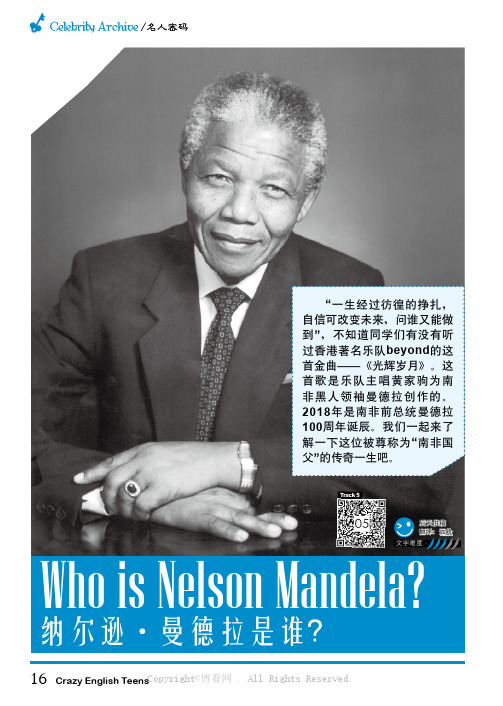
后天供稿翻译:远航文字难度·Who is Nelson Mandela?纳尔逊·曼德拉是谁?Track 51) endure [In5djuE ] v. 忍受2) dignity [5dI^nItI ] n. 尊严3) treat [tri:t ] v. 对待4) subject [5sQbdVIkt ] n. 经受者,对象5) racism [5reIsIzEm ] n. 种族主义6) vote [vEJt ] n. 投票权7) property [5pr ɒpEtI ] n. 财产8) capture [5kAptFE ] v. 抓捕9) imprison [Im5prIzn ] v. 监禁10) disharmony [5dIs5hB:mEnI ] n. 不和谐11) release [rI5li:s ] n. 释放12) violence [5vaIElEns ] n. 暴力13) charity [5tFArItI ] n. 慈善Nelson Mandela was born in July 1918. He is SouthAfrica’s first black President (1994~1999) and a braveman who 1)endured 27 years in prison with 2)dignity .Nelson’s parents couldn’t read or write, and he wasthe first in his family to attend school at age seven. Hisfather died when he was about nine, and he was sentto live with Jongintaba, the king of the Thembu, hispeople, and 3)treated as their son.Nelson went to University at Fort Hare and later theUniversity of Witwatersrand. He made many friends ofall colours and nationalities, but was the 4)subject of5)racism . Nelson became increasingly politically active,joining the African National Congress (the ANC) in1944 and helping to form the ANC Youth League. Atthe time in South Africa there were many things that theblacks were not allowed to do, including 6)vote and own7)property , and the ANC wanted to change that. Thispolicy was called “apartheid ” and the African NationalCongress was anti-apartheid.In 1962 Nelson was 8)captured and 9)imprisonedfor five years for encouraging the country to strike; thefollowing year he was charged with trying to overthrowthe government, and sentenced to life imprisonment.Nelson spent his many hard years in prisonstudying when he could and keeping in touch with theever-increasing 10)disharmony in South Africa, whichthreatened to break out into civil war. All over the worldpeople began to campaign for his 11)release . In 1990South Africa’s President de Klerk met Nelson andarranged for him to be released.After his release, Nelson and de Klerk workedtogether to end 12)violence in the country and restoreorder, and Nelson was elected President in 1994,serving for one term.After his presidency, Nelson Mandela focused on13)charity , setting up the Nelson Mandela Children’sFund and Nelson Mandela Foundation to fight povertyand HIV/AIDS. He won the Nobel Peace Prize (in 1993)and the US Presidential Medal of Freedom.纳尔逊·曼德拉出生于1918年7月。
Nelson Mandela
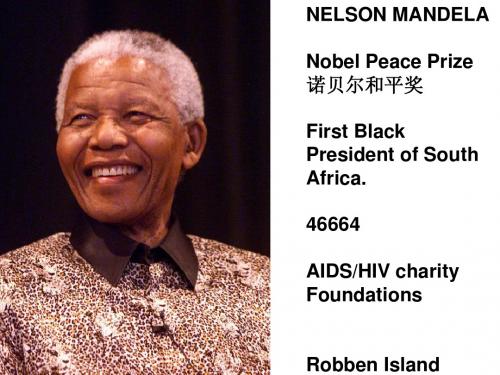
• Cape Town • When you are there, see the famous Table Mountain and eat delicious food. Cape Town is _____ _____ Robben Island Nelson Mandela _____. close to _______ to _____ in prison there. used be
NELSON MANDELA Nobel Peace Prize 诺贝尔和平奖 First Black President of South Africa. 46664 AIDS/HIV charity Foundations
Robben Island
Nelson Mandela
纳尔逊·罗利赫拉赫拉·曼德拉(Nelson Rolihlahla Mandela)是享誉全球的诺 贝尔和平奖得主。为了推翻南非白人种 族主义统治,他进行了长达50年 (1944—1994年)艰苦卓绝的斗争,铁 窗面壁28年(1962—1990年)。最终, 从阶下囚一跃成为南非第一任黑人总统, 为新南非开创了一个民主统一的局面。 南非终身名誉总统:纳尔逊·罗利赫 拉赫拉·曼德拉( Nelson Rolihlahla Mandela )(1918-)
• Port Elizabeth also has beautiful beaches. This for city is famous ________its gardens and parks _______ _______many interesting plants and which contain flowers. You can see plenty _____ birds there. of
曼德拉的一生英语短作文
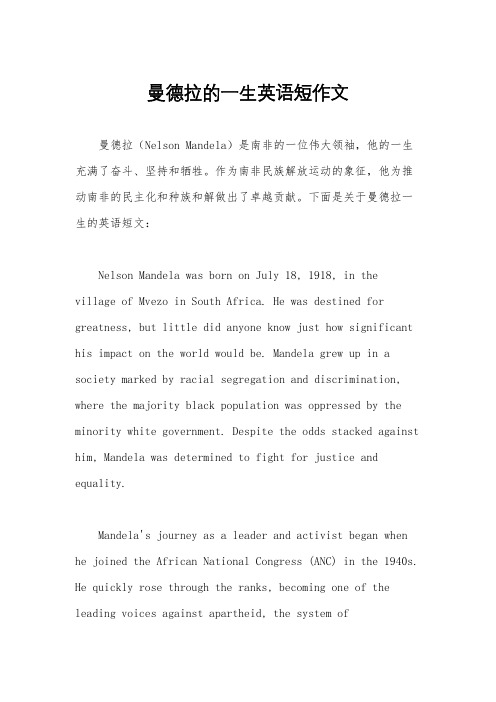
曼德拉的一生英语短作文曼德拉(Nelson Mandela)是南非的一位伟大领袖,他的一生充满了奋斗、坚持和牺牲。
作为南非民族解放运动的象征,他为推动南非的民主化和种族和解做出了卓越贡献。
下面是关于曼德拉一生的英语短文:Nelson Mandela was born on July 18, 1918, in thevillage of Mvezo in South Africa. He was destined for greatness, but little did anyone know just how significant his impact on the world would be. Mandela grew up in a society marked by racial segregation and discrimination, where the majority black population was oppressed by the minority white government. Despite the odds stacked against him, Mandela was determined to fight for justice and equality.Mandela's journey as a leader and activist began when he joined the African National Congress (ANC) in the 1940s. He quickly rose through the ranks, becoming one of the leading voices against apartheid, the system ofinstitutionalized racial segregation enforced by the South African government. Mandela's activism landed him in hot water with the authorities, and he was arrested multiple times for his political activities.In 1964, Mandela was sentenced to life in prison forhis involvement in anti-apartheid activities. He spent the next 27 years behind bars, enduring harsh conditions and separation from his family. Despite the hardships, Mandela remained steadfast in his commitment to the cause of freedom. His imprisonment only served to galvanize support for the anti-apartheid movement both within South Africaand around the world.Finally, in 1990, Mandela was released from prison, signaling the beginning of a new era for South Africa. He wasted no time in working towards reconciliation and democracy, leading negotiations with the government to dismantle apartheid and establish free and fair elections. Mandela's efforts culminated in the historic 1994 elections, in which he was elected as South Africa's first black president.As president, Mandela faced the daunting task of leading a deeply divided nation towards unity and reconciliation. He embraced the concept of forgiveness, famously declaring, "Courageous people do not fear forgiving, for the sake of peace." Mandela workedtirelessly to bridge the gap between black and white South Africans, promoting policies of inclusivity and equality.Mandela's presidency was marked by significant progress in areas such as healthcare, education, and social welfare. He also played a key role in promoting peace and stability across the African continent, earning him widespread admiration and respect both at home and abroad. Despite stepping down as president in 1999, Mandela continued to be a global advocate for human rights and social justice until his passing in 2013.In conclusion, Nelson Mandela's life serves as a testament to the power of perseverance, courage, and forgiveness. From his humble beginnings in rural South Africa to his historic presidency, Mandela remained true tohis principles and never wavered in his commitment to justice and equality. His legacy continues to inspire people around the world to strive for a better, more just society.。
高中英语必修一Unit 5 Reading(人教版)全面版
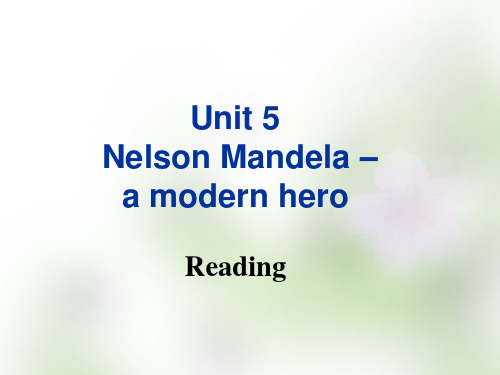
Paragraph 1:
1. How old was Elias when he first met Mandela? He was twelve.
2. What was Mandela at that time? He was a lawyer.
3.What did Mandela do to help black people?
Paragraph 4:
What was the situation of black people at that time?
3. Why didn’t Elias have a passbook? Because he wasn’t born there.
Paragraph 3:
How did Mandela help Elias?
Mandela told Elias how to get the correct papers so he could stay in Johannesburg.
Fast reading
How many parts can the text be divided into? Give the general idea of each part. Part 1 (para 1-2)
The life of Elias before he met Nelson Mandela.
vt. & vi. 投票; 选举 n. 投票; 选票; 表决 vt. 进攻; 攻击; 抨击 n. 暴力; 暴行 adj. 相等的; 平等的 adj. 反黑人的 vt. 判决;宣判 n. 民主主义;国家主义 n. 生计;谋生
Expressions Preview
1. 乐意做某事
nelson mandela关于语言的名言

nelson mandela关于语言的名言1. "If you talk to a man in a language he understands, that goes to his head. If you talk to him in his own language, that goes to his heart."2. "Language is not just a means of communication, it is the essence of our being."3. "Language is the key that unlocks the door to understanding different cultures and perspectives."4. "Language is the bridge that connects people of different backgrounds and enables them to work together towards a common goal."5. "We should celebrate and embrace linguistic diversity, as it enriches our society and promotes tolerance and understanding."6. "Language has the power to build bridges, break down barriers, and inspire change."7. "By learning someone's language, we not only gain access to their thoughts but also gain a deeper understanding of their soul."8. "Language is a tool of empowerment, enabling individuals to express themselves and advocate for their rights."9. "Language is a powerful weapon against oppression, as it gives a voice to the voiceless."10. "When we communicate in someone's native language, weshow respect and appreciation for their culture and heritage." 11. "Language embodies the spirit of a nation and serves as a symbol of its identity."12. "Through language, we preserve our history and pass on our traditions to future generations."13. "Language connects us to our roots and reminds us of where we came from."14. "In a multilingual society, understanding and accepting different languages is crucial for social cohesion and unity."15. "Language has the power to heal wounds and reconcile divided communities."16. "By embracing multiple languages, we enrich our minds and expand our horizons."17. "Language is a reflection of our thoughts, and through it, we can shape a better world."18. "The ability to learn and speak another person's language is a gesture of goodwill and promotes global friendship."19. "Language is the melody of the soul, and when we understand each other's melodies, harmony emerges."20. "Through language, we express our aspirations and hopes for a better future."21. "Language is the thread that weaves the fabric of humanitytogether."22. "Speaking someone's language is not just about words; it's about understanding their experience and perspective."23. "Language is the foundation of education and the key to unlocking opportunities for future generations."24. "Linguistic diversity is a treasure that should be cherished and protected."25. "Through language, we break down the walls of ignorance and build bridges of understanding."26. "Language is the lens through which we view the world, and by understanding different languages, our perspective becomes broader."27. "Language connects us to our ancestors and future generations, creating a sense of continuity and belonging."28. "The richness of a culture can be felt through its language, art, and traditions."29. "By learning someone's language, we open doors to meaningful connections and mutual respect."30. "Language promotes empathy and understanding, helping us to walk in someone else's shoes."31. "Through language, we express our deepest emotions and connect with others on a profound level."32. "Language is a gift that allows us to share our stories, dreams, and struggles with others."33. "When we speak someone's language, we show them that they matter and their voice is heard."34. "By preserving endangered languages, we preserve the diversity and richness of the human experience."35. "Language is a tool for peacebuilding and reconciliation, as it helps us to see the common humanity in all people."36. "Language is the foundation of a strong society, where individuals can freely express themselves and engage in meaningful dialogue."37. "Through language, we build bridges of understanding and dismantle the walls of prejudice and discrimination."38. "Language allows us to celebrate our differences and find common ground amidst diversity."39. "Speaking someone's language is an act of love and respect, fostering a sense of belonging and acceptance."40. "Language has the power to inspire generations and ignite movements for social change."41. "By valuing and promoting native languages, we protect and honor the cultural heritage of indigenous communities."42. "Language connects us to our ancestors, enabling us toappreciate their wisdom and learn from their experiences."43. "Through language, we can amplify marginalized voices and advocate for social justice."44. "Language is a vibrant tapestry that tells the story of our shared humanity."45. "Linguistic diversity is a treasure that enriches us all and strengthens the fabric of society."46. "Language is the key that unlocks the doors of understanding between cultures."47. "By speaking someone's language, we show them that their culture is valued and respected."48. "Language is the vehicle through which we share knowledge and ideas, propelling progress and innovation."49. "Linguistic diversity is a reflection of the diversity of human thought and expression."50. "Language is a bridge that allows us to connect with people across borders and build international friendships."51. "Through language, we can challenge prejudices and promote social inclusivity."52. "Linguistic diversity is an asset that should be celebrated and utilized to foster creativity and innovation."53. "Language is a tool for diplomacy, enabling effectivecommunication and dialogue between nations."54. "By embracing linguistic diversity, we create a more inclusive and equitable society."55. "Language is the foundation of a strong and vibrant culture."56. "Through language, we can preserve and share the knowledge and wisdom of our ancestors."57. "Language is the key to understanding different perspectives and fostering empathy."58. "By learning someone's language, we open doors to economic opportunities and cross-cultural collaboration."59. "Language is a powerful force for change and social transformation."60. "Through language, we honor and respect the experiences and contributions of all people."。
Unit 5 Nelson Mandela
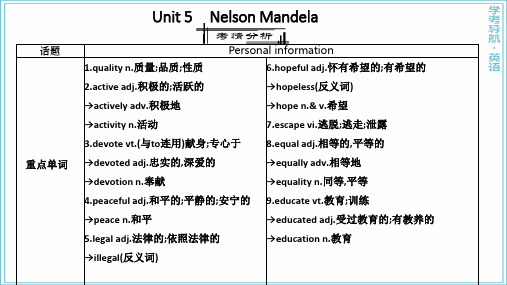
→peace n.和平
5.legal adj.法律的;依照法律的 →illegal(反义词)
→educated adj.受过教育的;有教养的
→education n.教育
10.relative n.亲戚;亲属 →relation n.关系
→terrorism n.恐怖主义 →terrorist n.恐怖分子
2.They’ll never forget July 1 when Hong Kong returned to its motherland.
3.There are many reasons why people like traveling.
征求意见:
What do you think of...? What’s your opinion?
12.be active in sth. 积极从事某事
1.The last thirty years have seen the greatest number of laws stopping our rights and progress,until today we have reached a stage where we have almost no rights at all.
【即时巩固】 单项选择 (1)—How did your father deal with you? B being punished. —We were lucky to A.admit B.escape C.consider D.stop (2)Mark often attempts to escape B whenever he breaks traffic regulations. A.having been fined B.being fined C.to have been fined D.to be fined 考点5 equal vt. 抵得上 adj. 相等的;胜任的 n. 同等/相等的人或物 【例句研读】 (1)He equals me in strength but not in intelligence.他和我力气 相当 ,但智力不同。 (2)Are men equal to women in physical strength?在体力上男人和女人 相同 吗? (3)She did not feel equal to receiving visitors.她觉得自己 不适合 接待来客。 无与伦比 (4)Yao Ming is a basketball player without equal in China.在中国,姚明是个_________ 的篮球运动员。
人教版高中英语必修1Unit 5 Nelson Mandela reading
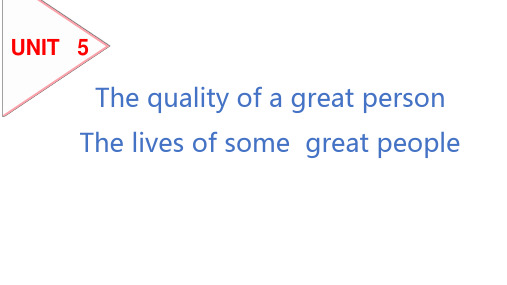
例句: 1. As soon as he got inside, the dog shook himself. 他一进来,狗就开始摇头摆尾。 2. They stopped you as soon as you deviated from the script. 一旦你偏离了剧本的内容,他们就会喊停。 3. As soon as the two chicks hatch, they leave the nest burrow. 两只小鸟一出壳就离开了巢穴。 4. As soon as we were inside, the rain began to bucket down. 我们刚进屋,大雨便倾盆而下。 5. As soon as relations improve they will be allowed to go. 一旦关系有所改善,他们就可以获准离开。
She wanted to continue working after she was married.
她想结婚后继续工作。
拓展练习
He was generous with his time, ________ I was grateful for. A.which B.that C.as D.不填
Be generous with your praise. Point out the specifics of their personality and behaviour that add value.
大胆的赞赏他们。大方的对待称攒,指出他们的性格 特征和行为价值。
In a nutshell, be generous with the information you do possess, but also be aware and open about the things that you do not know.
曼德拉人物介绍英语作文

Nelson Mandela,a name synonymous with resilience,leadership,and the indomitable spirit of freedom,was born on July18,1918,in the village of Qunu,located in the Eastern Cape of South Africa.His life was a testament to the power of perseverance and the unyielding quest for justice and equality.Mandelas early life was steeped in the traditions of the Thembu tribe, which instilled in him a sense of dignity and respect for community.His father,Gadla Henry Mphakanyiswa,was a chief,and his mother,Nosekeni Fanny,was a daughter of a chief,both of whom recognized the potential in young Mandela.They sent him to a Methodist mission school,where he was given the name Nelson,and later to Clarkebury Boarding Institute and the University of Fort Hare.Mandelas political awakening began during his university years,where he became involved in the African National Congress ANC,a movement that would define his lifes work.He was expelled from the university for his involvement in a student protest,but this setback did not deter him. Instead,it fueled his commitment to the cause of ending racial segregation and inequality in South Africa.In the1940s and1950s,Mandela emerged as a prominent figure in the antiapartheid movement.He cofounded the ANC Youth League and later became a leader within the organization.His charisma and eloquence made him a powerful orator,inspiring countless South Africans to join the struggle for freedom.Mandelas commitment to nonviolent resistance was evident in his early activism.However,as the governments oppressive tactics escalated,so too did the methods of the resistance.In1961,Mandela cofounded Umkhonto we Sizwe,the armed wing of the ANC,which engaged in acts of sabotage against the apartheid regime.This marked a significant shift in his approach to the struggle,one that would ultimately lead to his arrest and imprisonment.On August5,1962,Mandela was arrested and charged with inciting workers to strike and leaving the country without a passport.He was sentenced to five years in prison.However,his legal troubles were far from over.In1963,he was brought to trial again,this time for sabotage and conspiracy to overthrow the government.The Rivonia Trial,as it came to be known,was a turning point in Mandelas life and the antiapartheid movement.During his27year imprisonment,Mandela became a global symbol of the fight against injustice.His unwavering spirit and steadfast belief in the cause inspired people around the world.While in prison,he continued to study and educate himself,preparing for the day he would once again walk free.In1990,after years of international pressure and protests,the South African government finally released Mandela.His release was met with jubilant celebrations and a renewed sense of hope for the future.Mandelas first public speech upon his release encapsulated his vision for a democratic and inclusive South Africa:I stand here before you not as aprophet but as a humble servant of you,the people.The following years were marked by intense negotiations between the ANC and the South African government,culminating in the countrys first democratic elections in1994.Mandela,now the leader of the ANC,was elected as the first black president of South Africa,a historic moment that signified the end of the apartheid era.Mandelas presidency was characterized by his efforts to foster reconciliation and unity among South Africas diverse population.The Truth and Reconciliation Commission,established under his leadership,was a groundbreaking initiative aimed at addressing the atrocities of the past and promoting healing and forgiveness.Beyond his political achievements,Mandelas legacy is also defined by his humanitarian work.He established the Nelson Mandela Foundation,which focuses on promoting freedom,equality,and social justice.His tireless efforts to improve the lives of the disadvantaged,particularly children, earned him the Nobel Peace Prize in1993,alongside then South African President F.W.de Klerk.Mandelas life was not without its challenges and controversies,but his unwavering commitment to justice and equality has left an indelible mark on history.His passing on December5,2013,was mourned by millions around the world,but his spirit and message of hope continue to inspire generations.In conclusion,Nelson Mandela was a beacon of hope and a symbol of the human capacity for resilience and transformation.His life serves as a reminder that even in the face of seemingly insurmountable odds,one person can make a difference and change the course of history.As we reflect on his legacy,we are reminded of the power of perseverance,the importance of standing up for what is right,and the enduring impact of a life dedicated to the pursuit of freedom and justice.。
人教版高中英语 必修一 Unit5 《Nelson Mandela ---a modern hero
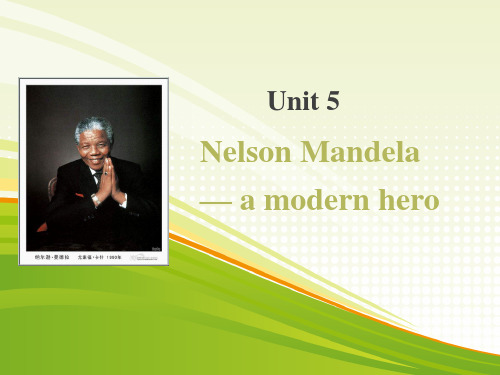
Are they all great people?
Fill in the table below and then talk about what kind of qualities they have? Give your reasons.
As a great person
Should he/she help others?
In 1961, he became the President of the African National Congress (ANC). He helped the black people to get the same rights as the white people. He fought for the black people and was in prison for thirty years.
Mohandas Gandhi
Mohandas Gandhi (1869-1948), India He formed an organization leading the Indian’s struggle for equal rights. He was a model of a different kind of political leader. Mohandas Gandhi was educated in the United Kingdom and received a law degree from University College in London.
He strongly believed in the three principles: nationalism; rights; people’s livelihood.
高中英语必修1人教版精品导学案:Unit 5_Nelson_Mandela

Unit 5 Nelson Mand ela--- a modern hero第一课时:Warming-up & vocabulary预习导学本单元重点呈现:词汇部分:________ n.质量;品质;性质________ adj. 吝啬的;自私的________adj. 活跃的;积极的________ adj. 慷慨的;大方的________ n. 自我;自身________ adj. 自私的;________ adj. 无私的;忘我的________ adv.无私地;忘我地________ vt. (与to连用) 献身;专心于________ adj. 忠实的;深爱的________ vt.建立;建设________ n. 共和国;共和政体________ n. 法则;原则;原理________ adj. 和平的;平静的________ n. 人类________ n. 律师________ n.指导;领导________ adj. 法律的;依照法律的________ n.费(会费,学费等)________ adj. 怀有希望的________ n. 青年;青年时期________ n.同盟;联盟;联合会________ n. 舞台;阶段;时期________ vt. & vi. 投票;选举________ vt. 进攻;攻击;抨击________ n.暴力;暴行________ adj. 相等的;平等的________ adj. 乐意的;自愿的________ adj. 不公平的;不公正的________ vi. 逃脱;逃走;泄漏________ n. 毛毯;毯子________ vt. 教育;训练________ adj. 受过教育的;有教养的________ vi. 请求;乞求________ n. 亲戚;亲属________ n. 恐怖;可怕的人________ n. 残忍;残酷________ n. 报酬;奖金________ vt. 判决;宣判________ n. 总统;会长;校长________ n. 意见;看法;主张短语部分:填空2 .as a matter ________fact 事实上3. blow ________ 使充气爆炸4. ________danger 在危险、受罚、痛苦、忧虑等的处境中5. turn ________ 求助于;致力于6. lose ________ 丧失勇气或信心7. come ________power 当权;执政8. set ________ 建立;设立9. be sentenced ________ death判处死刑10. answer violence ________violence 以暴制暴11. be equal ________ 平等;相等12. ________the first time 第一次13 ________one’s opinion 依……看来14 reward sb. ________ 因为……酬谢某人15. be active ________ 活跃16. be ________to do sth. 愿意做某事17. devote oneself _______ 献身于18. believe ______ 相信19._______ a peaceful way 用一种和平的方式20. fight_____ 与…作斗争语法部分:定语从句以关系副词where, when, why,以及以介词(preposition)+关系代词(which/whom) 引导的定语从句1. The school where I studied for only two years was three kilometers away.2. The time when I first met Nelson Mandela was a very difficult period of my life.3. The reason why I got a job was because of my hard work.4. We were put into a position in which we had to accept we were less important, or fight the government.5. Mandela was the black lawyer to whom I went for advice.6. He was generous with his time, for which I was grateful口语交际部分:一、征求意见(Asking for opinions)1. What _____ you _______...?2. What's your _______?3. _____ are your ideas?4. Do you have any thoughts ____ that?5. _____ do you feel ____ that?二、发表意见(Giving opinions)7. I think/ I don't think...8. I believe / I don't believe(that)...9. In my ___10. ___ my understanding, …11. I feel that…/I don’t feel that…12. I’m ____ you.自主学习:根据下列句子及所给汉语注释,在横线上写出各单词的正确形式:1. It was___________ (大方) of you to give me a hand with my English.2. Your ___________ (亲戚) are the members of your family.3. In my _________(意见,观点), your plan is unreasonable.4. Do women have the right to __________ (投票)in your country?5. Two of the prisoners have ________ (逃跑) .6. You shouldn't think only about your own needs. It's too ____________ (自私)7. He is very ________ (吝啬)and has never paid the bill when we have dinner together.8. Some of the games are full of _________(暴力). Too much fighting is not good for young kids to play.9. Young people should be _________ (教育)in how to protect nature.10. He became _________(总统) of the United States this year.11. The official ordered the prisoners be __________ to death right away. (判处)12. Lots of ____________ lost their lives in fighting with the fire. (英雄)13. Many young people are __________ to be volunteers in helping those in poor areas. (愿意)14. He studied law in his __________, and later, he became a lawyer. (青年)15. The old man __________ the boy with a smile for helping him.(报答,酬谢)16. He _________ me in strength but not in intelligence. (平等)17. He was so poor that he had to _________ for his bread. (乞讨)18. He studied law in his spare time and became a ___________.(律师)19. They decided to ____________ a special economic zone in the city. (建立)20. He is over 90 and not ___________.(活跃)实战演练单词释义:从B栏找出A栏单词的英文释义A B1. principle: ready or able to take action2. escape: thinking only about one's own needs or wishes but not about other people'sneeds or wishes.3. active: basic truth, general law of cause and effect4. vote: belief or judgment not founded on complete knowledge5. opinion: willing to give money, spend time to help people6. generous: (right to give an) expression of opinion or will by person for or againstsomething, esp. putting up hands.7. devoted: something such as courage, honesty that people may have as part of theirnature.8. mean: get free, find way out9. quality: giving someone or something a lot of love or attention10. selfish: not wanting to spend money反馈检测单项选择:1. He remains _____in politics in his sixties.A. actB. actionC. activeD. activity2. Girls are equal ______ boys.A. inB. withC. onD. to3. The year 2008________ a series of events in China, like earthquake in Sichuan, Olympic games in Beijing.A .watched B. saw C. observed D. looked4. It is _____ of you to give me a hand with my English.A. generousB. kindnessC. importantD. necessary5. We must ____ the students to become useful people for our motherland.A. educateB. educationC. educatingD. educated6. It is against my _____ to tell lies.A. wordB. orderC. promiseD. principle7. The slave owners treated the slaves with great ______.A cruel B. cool C. cruelty D. warm8. The judge _____ him to two years in prison.A. judgeB. judgedC. sentencedD. sentence9. He was too ____ to pay for the meal.A . generously B. mean C. kind D. warm-hearted10. ----Sorry to ____ you, but could I ask you a question?----No problem.A . worry B. prevent C. trouble D. disappoint11. ---- Why does she always ask you for help?---- There is no one else_______.A . whose to turn to B. she can turn to C. whom to turn D. her to turn12. As a ___ for passing his examination, he got a new watch from his parents.A. giftB. presentC. rewardD. choice13. He has ___most of his time ___ painting.A. devote; toB. devotes; withC. devoted; toD. devoting; on14. The People’s Republi c of China was ____ in 1949.A. foundB. foundedC. findD. finding15. We’re ____. There is no time for argument.A. in the troubleB. in troublesC. in troubleD. in a trouble第二课时:Reading预习导学重点词汇:1. ____ (vt.)献身----- ____ (n.)2. _____(n.)和平-----_____(adj.)和平的-----_____(adv.) 和平地3. _____(n.)法律----- _____(n.)律师----- _____(adj.)合法的;法定的4. _____(n.)青年-----(adj.)_____青年的;年轻的5. ______(n.)暴力-----_____ (adj.)暴力的6. ____ (adj.)平等的-----____ (adv.)平等地-----_____ (n.)平等7. _____(n.)自我-----____ (adv.)自私地-----_____(adj.)无私的------_____(adv.)无私地8. _____ (n. & v.) 希望-----____( adj.)有希望的-----_____(adv.)有希望地阅读课文:一、判断正误:1. When he met Mandela in 1953, Elias was in a very poor condition in his life.2. His family could afford the school fees and the bus fare.3. He received good education.4. He joined the ANC Youth League.5. Elias was unwilling to help people achieve their dream of making black and white people equal.6. Elias was willing to blow up government buildings.7. At last, they decided to answer violence with violence.二、根据课文内容填空:Elias’ story1. The first time when I met Nelson Mandela was a very difficult period of my life.2. This was a time when one had got to have a passbook to live in Johannesburg.3. The last thirty years have seen the greatest number of laws stopping our rights and progress….4…. We were put into a position in which we had either to accept we were less important or fight the government.实战演练将下列短语译成英文:1. 丧失勇气、信心__________.2. 处于困难中__________3. 在....... 方面积极__________4. 失去工作__________5. 被判刑__________6. 等于,胜任__________7. 以暴力反抗暴力__________8. 事实上__________9. 炸毁__________10. 愿意做某事__________反馈检测阅读理解The vacation's over for American space tourist Richard Garriott on Friday, the 47-year-old computer games designer returned safely to Earth after a 10-day visit to the International Space (ISS). The capsule(太空舱)carrying Garriott and two astronauts successfully touched down near the town of Arkalyk, in the central Asian country of Kazakhstan.Garrioot's father, former NASA astronaut Owen Garriott, was there to greet his son on the ground. After the younger Garriott went out of the capsule, his father patted him on thehead, and asked, " How come you look so fresh and ready to go?" To which Garriott replied, " Because I'm fresh and ready to go again. What a great ride that was!"Interest in space tou people who can afford the high price.Garriott is the sixth private citizen to travel into space. On October 12, his dream of following his father's footsteps came true as he took off aboard an Russian rocket. Garriott is the first American to follow his father into space. The Austin, Texas resident paid$30 million for the holiday in orbit(轨道).b.Space plans to compare his photos with those his father took to see how Earth's environment has changed in the past 35 years.1. How did Richard Garriott feel after returning from space?A .Tired B. Excited C. Disappointed D. Satisfied.2. What do we know about Richard Garriott according to the passage?A. He followed his father's step into space.B. He was tired and didn’t want to go any more.C. He stayed in space for more than one month.D. He is the first private citizen to travel into space.3. He took pictures of the Earth's surface as his father did 35 years ago, he wanted to find out_____.A . Whether they chose different scenes to take photos.B. Whether they chose same scenes to take photosC. Whether the moon surface has changed in the past 35 years.D. Whether the earth environment has changed in the past 35 years.4. We can infer from the passage that________.A. Space travelling is becoming well received.B. Richard Garriott went into space with his father.C. Richard Garriott's father went into space 30 years ago.D. Traveling into space costs a lot of money.第三课时:Grammar预习导学根据课文内容填空:1. The time ______ I first met Nelson Mandela was a very difficult period of my life.2. It was in 1952 and Mandela was the black lawyer to ____ I went for advice.3. This was a time ____ one had got to have a passbook to live in Johannesburg.4. The places outside the towns____ they were sent to live were the poorest parts of south Africa.5. We were put into a position in ____ we had either to accept we were less important or fight the government.6. It was a prison from ____ no one escaped.7. He taught us during the lunch breaks and the evenings____ we should have been asleep.8. The school ____I studied for only two years was three kilometers away.9. The day ____ Nelson Mandela helped me was one of my happiest.要点点拨:定语从句:以where, when, why引导1. where 指______, 在从句中作_______. Where =in which.The school was three kilometers away. I studied in the school for only two years.____________________________________________________________________. When =on which/ in which/ at which.The time was a very difficult period of my life. I first met Nelson Mandela at the time._____________________________________________________________________ .Why=for whichThe reason was because of my hard work. I got a job for the reason._____________________________________________________________________ _.4.关系副词和关系代词的判断方法:关系副词和关系代词的选择是根据先行词在定语从句中的成分。
Unit-5-Nelson-Mandela语言知识点与运用
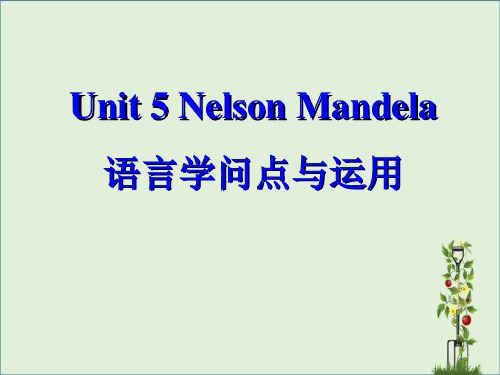
9. believe in
1. 信仰 Christians believe in Jesus. 基督徒信仰 。 2. 信任 We believe in him. 我们信任他。
3. 信任...的效用 Jim believes in fresh air and morning exercises. 吉姆坚信新颖空气及早操有好处。
12. fight against/for/with The soldiers fought bravely _a_g_a_i_n_st_ the enemy _fo_r_ the liberation _w_i_th_ their comrades.
13. be…away有…远(指距离、时间) 1) 我家离这里只有两条街。
My house is only 2 blocks away from here. 2) 他的生日在两周以后。 His birthday is two weeks away.
in two weeks.
14. worry vt. worry sb. that 使某人担忧 worry oneself 使自己担忧
17. The last thirty years have seen the greatest number of… 某些动词(see, find, witness等)主语有时不 是人而是物, 即拟人用法, 使句子生动。 1) This old house has seen good days. 2) Dusk (黄昏) found a boy crying in the
7. die for 为某种事业或目的而死 die for one’s country/ the people/ the
cause. die of 死于内因 die from 死于外因 die from a car accident. 由于车祸而死 die by 死于暴力, 刀或剑等凶器 die by the sword/hanging.
高中英语 Unit 5 Nelson Mandela — a modern hero Section
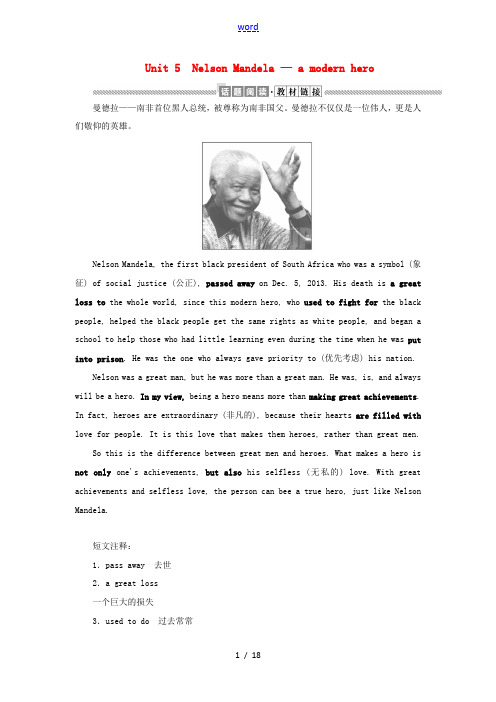
Unit 5 Nelson Mandela — a modern hero曼德拉——南非首位黑人总统,被尊称为南非国父。
曼德拉不仅仅是一位伟人,更是人们敬仰的英雄。
Nelson Mandela, the first black president of South Africa who was a symbol (象征) of social justice (公正), passed away on Dec. 5, 2013. His death is a great loss to the whole world, since this modern hero, who used to fight for the black people, helped the black people get the same rights as white people, and began a school to help those who had little learning even during the time when he was put into prison. He was the one who always gave priority to (优先考虑) his nation.Nelson was a great man, but he was more than a great man. He was, is, and always will be a hero. In my view, being a hero means more than making great achievements. In fact, heroes are extraordinary (非凡的), because their hearts are filled with love for people. It is this love that makes them heroes, rather than great men.So this is the difference between great men and heroes. What makes a hero is not only one's achievements, but also his selfless (无私的) love. With great achievements and selfless love, the person can bee a true hero, just like Nelson Mandela.短文注释:1.pass away 去世2.a great loss一个巨大的损失3.used to do 过去常常4.fight for... 为……而奋斗5.put... into prison将……投入监狱6.in my view 在我看来7.make great achievements取得巨大成就8.be filled with 充满9.not only... but also...不但……而且……Section ⅠWarming Up & Reading —Prereading重点单词写作词汇1.quality n.质量;品质;性质2.mean adj. 吝啬的;自私的;卑鄙的3.generous adj. 慷慨的;大方的4.found vt. 建立;建设5.principle n. 法则;原则6.stage n. 舞台;阶段;时期7.vote vt.&vi. 投票;选举n. 投票;选票;表决8.attack vt. 进攻;攻击;抨击拓展词汇1.active adj.积极的;活跃的→actively adv.积极地→activity n.活动2.devote vt.(与to连用)献身;专心于→devoted adj.忠实的;深爱的→devotion n.热爱;献身;奉献3.peaceful adj.和平的;平静的;安宁的→peacefully adv.和平地→peacen.和平;平静;和睦①peace→peaceful和平的②pain→painful 痛苦的③harm→harmful 有害的④power→powerful 强大的⑤meaning→meaningful 有意义的⑥cheer→cheerful 欢乐的后缀ance高频名词全接触①guidance 指导;领导②importance 重要;重要性③ignorance 无知;愚昧④signifi cance 意义;重要性⑤appearance 出现⑥tolerance 宽容;容忍self反身代词①myself 我自己②yourself 你自己③himself 他自己④herself 她自己⑤itself 它自己⑥ourselves 我们自己⑦yourselves 你们自己⑧themselves 他们自己“out of+n.”短语集锦①out of work失业②out of control 失控③out of mind 心不在焉④out of order 有毛病;出故障⑤out of sight 看不见“in+n.”短语面面观①in trouble 在困境中②in danger 处于危险中③in return 作为回报④in vain 徒劳地⑤in order 井然有序⑥in place 在适当的位置Step One:Warming upA famous person may not be a great person, but a great person must be a famous person.1.Who do you think are great persons in the following pictures?答案:A,B and E2.What do you know about Nelson Mandela?He_devotes_his_life_to_helping_his_people_get_the_same_rights_as_white_peop le_in_his_country./He_is_a_national_leader_who_has_been_fighting_for_making_bla ck_and_white_people_equal./Nelson_Mandela_is_regarded_as_one_of_the_greatest_sp iritual_and_political_leaders_of_our_time.Step Two:Fast readingSkim the text and choose the best answers.1.What's the main idea of the text?A.The life of black workers.B.The fight between Mandela and the white people.C.The stories between Mandela and Elias.D.The education of Elias.答案:C2.Match the main idea of each part.Paras.1~2(B) A.The change of Elias' life after he met Nelson Mandela and what Mandela didParas.3~7(A) B.The life of Elias before he met Nelson MandelaStep Three:Careful readingRead the reading passage carefully and choose the best answers according to the text.1.Why did Elias have to leave school?A.He didn't have a passbook.B.His home was far from the school.C.His family couldn't afford the school fees.D.He couldn't read or write.答案:C2.Nelson Mandela opened a black law firm in order to ________.A.make moneyB.help the poor black people with their problemsC.make himself famousD.study law答案:B3.How did Nelson Mandela help Elias keep his job?A.He talked with Elias' boss.B.He helped him get the correct papers.C.He lent him some money.D.He asked him to go to court.答案:B4.What dream did Nelson Mandela have?A.To bee the president of South Africa.B.To win the Nobel Peace Prize.C.To make black and white people equal.D.To blow up some government buildings.答案:CStep Four:Explain difficult sentences1.The time when I first met Nelson Mandela was a very difficult period of my life.[句式分析][尝试翻译]第一次见到纳尔逊·曼德拉的时候,是我一生中非常艰难的时期。
英语必修一unit5_Nelson_Mandela.语言运用

be well educated _________________ 处于……的阶段 _________________ _________________ 使充气;爆炸
乐意做某事 12.be willing to do sth.________________ 用暴力反抗暴力 13.answer violence with violence_____________ ___________________ 在危险,痛苦等处境中 建立一家法律事务所 15.set up a law office ___________________ 14.be in trouble
4.hope v.& n. 希望 hopeful ____________adj.有希望的
hopeless ____________adj.没有希望的
hopefully ____________adv.有希望
____________adv.无望地,绝望地 hopelessly
5.devote vt.(与to 连用)献身,专心于 _________adj 忠实的,深爱着的 devoted _________n. 奉献 devotion ___________[搭配]把…用在/献给… devote ... to ... be devoted to ___________[搭配]专心于,忠诚于
3. devote vt.
献身,专心于
链接
(1)devote oneself to 献身,致力,专心 devote...to... 把……用于…… 做状语时要用 – (2)devoted adj.忠实的,深爱的 ed 形式 devotion n.关爱,关照;奉献,忠诚 be devoted to 深爱,致力于 1.完成句子 (1)Shedevoted herself to ________________(专心于) her career. are devoted to (2)They _______________ (深爱着)their children. devotion to (3)Her ____________(全身心投入) the job left her with very little free time.
纳尔逊·曼德拉语录

纳尔逊·曼德拉语录"Education is the most powerful weapon which you can use to change the world." - Nelson Mandela"教育是你可以用来改变世界的最强大的武器。
" - 纳尔逊·曼德拉"It always seems impossible until it's done." - Nelson Mandela"直到完成之前,一切都看似不可能。
" - 纳尔逊·曼德拉"I am fundamentally an optimist. Whether that comes from nature or nurture, I cannot say. Part of being optimistic is keeping one's head pointed toward the sun, one's feet moving forward. There were many dark moments when my faith in humanity was sorely tested, but I would not and could not give myself up to despair. That way lays defeat and death." - Nelson Mandela"我基本上是一个乐观主义者。
无论这是源于天性还是培养,我无法说。
乐观的一部分是把头朝向太阳,脚步向前迈进。
在我对人性的信念受到严峻考验的许多黑暗时刻,但我不会也不能陷入绝望。
那样只会导致失败和死亡。
" - 纳尔逊·曼德拉"I learned that courage was not the absence of fear, but the triumph over it. The brave man is not he who does not feel afraid, but he who conquers that fear." - Nelson Mandela"我学到,勇气并不是不害怕,而是战胜它。
Unit-Nelson-Mandela曼德拉课件
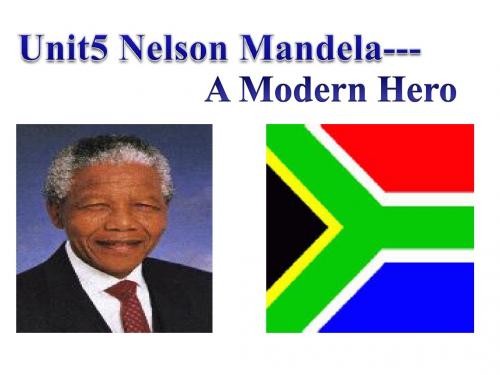
• What was Elias’ attitude towards the unfair situation black people faced? How do you know? • Why did Nelson Mandela turn to violence to make black and white people equal?
2.see, find 的拟人用法 当see, find 的主语是物,表示在某段时 期,某物经历了,见证了,目睹了… Dusk only saw a little boy crying in the street. National Day found more people shopping.
Reading
• Read the first and the second paragraphs and try to work out some basic information of Elias and the problem he was facing.
Reading
name birth place
担心 青年团 事实上 把某人投入监狱 使爆炸,充气 失业 失去信心
Nelson Mandela Barack Obama He was elected the first He was the first black president in South Africa. African American president in U.S. history
What was Elias’ attitude towards the unfair situation black people faced? How do you know?
upset/angry • Elias felt ___________about the unfair situation black people faced.
曼德拉总统生平英语简介
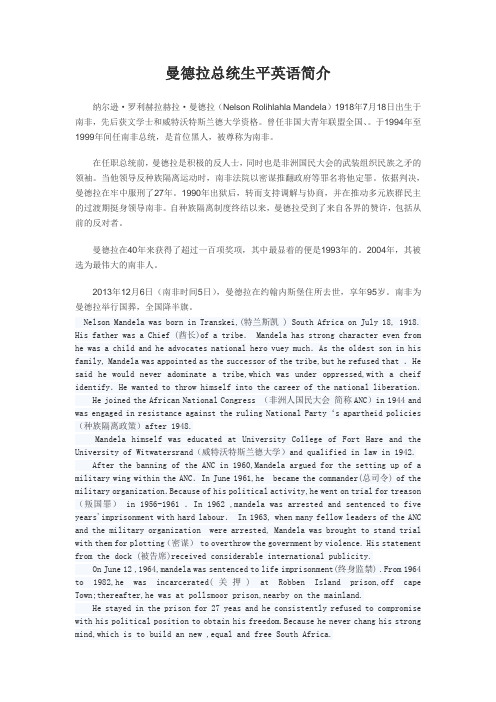
曼德拉总统生平英语简介纳尔逊·罗利赫拉赫拉·曼德拉(Nelson Rolihlahla Mandela)1918年7月18日出生于南非,先后获文学士和威特沃特斯兰德大学资格。
曾任非国大青年联盟全国、。
于1994年至1999年间任南非总统,是首位黑人,被尊称为南非。
在任职总统前,曼德拉是积极的反人士,同时也是非洲国民大会的武装组织民族之矛的领袖。
当他领导反种族隔离运动时,南非法院以密谋推翻政府等罪名将他定罪。
依据判决,曼德拉在牢中服刑了27年。
1990年出狱后,转而支持调解与协商,并在推动多元族群民主的过渡期挺身领导南非。
自种族隔离制度终结以来,曼德拉受到了来自各界的赞许,包括从前的反对者。
曼德拉在40年来获得了超过一百项奖项,其中最显着的便是1993年的。
2004年,其被选为最伟大的南非人。
2013年12月6日(南非时间5日),曼德拉在约翰内斯堡住所去世,享年95岁。
南非为曼德拉举行国葬,全国降半旗。
Nelson Mandela was born in Transkei,(特兰斯凯 ) South Africa on July 18, 1918. His father was a Chief (酋长)of a tribe. Mandela has strong character even from he was a child and he advocates national hero vuey much.As the oldest son in his family, Mandela was appointed as the successor of the tribe,but he refused that .He said he would never adominate a tribe,which was under oppressed,with a cheif identify.He wanted to throw himself into the career of the national liberation.He joined the African National Congress (非洲人国民大会简称ANC)in 1944 and was engaged in resistance against the ruling National Party‘s aparth eid policies (种族隔离政策)after 1948.Mandela himself was educated at University College of Fort Hare and the University of Witwatersrand(威特沃特斯兰德大学)and qualified in law in 1942.After the banning of the ANC in 1960,Mandela argued for the setting up of a military wing within the ANC.In June 1961,he became the commander(总司令) of the military organization.Because of his political activity,he went on trial for treason (叛国罪) in 1956-1961 .In 1962 ,mandela was arrested and sentenced to five years'imprisonment with hard labour. In 1963, when many fellow leaders of the ANC and the military organization were arrested, Mandela was brought to stand trial with them for plotting(密谋) to overthrow the government by violence. His statement from the dock (被告席)received considerable international publicity.On June 12 ,1964,mandela was sentenced to life imprisonment(终身监禁) .From 1964 to 1982,he was incarcerated(关押) at Robben Island prison,off cape Town;thereafter,he was at pollsmoor prison,nearby on the mainland.He stayed in the prison for 27 yeas and he consistently refused to compromise with his political position to obtain his freedom.Because he never chang his strong mind,which is to build an new ,equal and free South Africa.During his years in prison ,mandela's reputation grew steady.He became a potent symbol of resistance as the anti-apartheid movement.At last ,he was released on February 18,1990.After his release,he plunged himself into his life's career.In 1991,at the first national conference of the ANC held inside South Africa,he was elected President of the ANC.In 1994,the ANC won the general election,mandela became the first Black President in the history of South Africa.In his life time ,he won nearly 100 awards.In 1993,he was honored with the Nobel Peace Prize,which was in order to commend his contribution in againsting racial discrimination.Mandla also pays close attention to AIDS(艾滋病).He established AIDS foundation named after him.The time of AfricaIn a fairly long period,Africa was excluded from great international competition,because of its apartheid policies(种族隔离政策).But Africans love sports very mcuh.In order to hold The 2010 World Cup,although Mandela is old aged and health condition is not very good,he also did his best.On June,11,2010, The World Cup of South Africa began.This was not just a football feast for Aricans but something more.This fulfilled a great leader's long-cherished wish:peace,solidarity and so on.In his life time ,he won nearly 100 awards.In 1993,he was honored with the Nobel Peace Prize,which was in order to commend his contribution in againsting racial discrimination.Now ,the brithday of Mandela became an international festival.July,18---the International Mandela Day.语录When I walked out of the prison cell towards the door leading to freedom, I have made it clear his own pain and resentment if not able to stay behind, so in fact I still in prison.当我走出囚室迈向通往自由的大门时,我已经清楚,自己若不能把痛苦与怨恨留在身后,那么其实我人在狱中。
高一英语必修一Unit5课文翻译
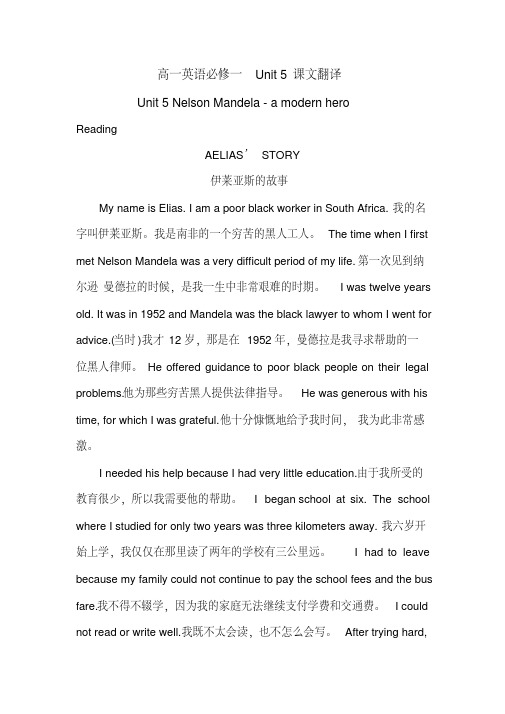
高一英语必修一Unit 5课文翻译Unit 5 Nelson Mandela - a modern heroReadingAELIAS’ STORY伊莱亚斯的故事My name is Elias. I am a poor black worker in South Africa.我的名字叫伊莱亚斯。
我是南非的一个穷苦的黑人工人。
The time when I first met Nelson Mandela was a very difficult period of my life.第一次见到纳尔逊·曼德拉的时候,是我一生中非常艰难的时期。
I was twelve years old. It was in 1952 and Mandela was the black lawyer to whom I went for advice.(当时)我才12岁,那是在1952年,曼德拉是我寻求帮助的一位黑人律师。
He offered guidance to poor black people on their legal problems.他为那些穷苦黑人提供法律指导。
He was generous with his time, for which I was grateful.他十分慷慨地给予我时间,我为此非常感激。
I needed his help because I had very little education.由于我所受的教育很少,所以我需要他的帮助。
I began school at six. The school where I studied for only two years was three kilometers away.我六岁开始上学,我仅仅在那里读了两年的学校有三公里远。
I had to leave because my family could not continue to pay the school fees and the bus fare.我不得不辍学,因为我的家庭无法继续支付学费和交通费。
Unit5_Nelson_Mandela全单元课件精编版
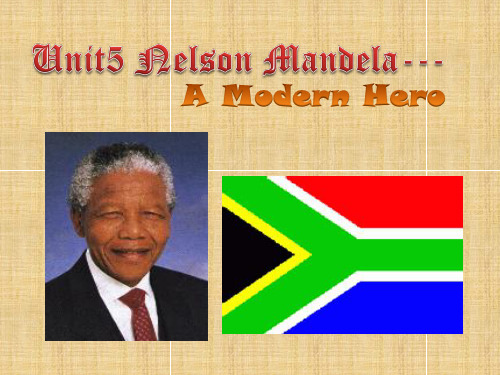
leaders.
⑵Black people could not get the __jo_b___ they wanted. ⑶The place where they lived were_th__e_p_o_o_r_e_st__a_re_a_s. ⑷They couldn’tgr_o_w__f_o_o_d___ there. 2. Why did Elias help Mandela blow up some
About Elias
2.He didn’t have a(n) __________________ in Johannesburg and
was afraid of _lo_s__in_g___ his job and l_e_a_v__in__g__th__e_r_e__ there. 3.He_t_u_r_n__e_d__t_oMandela for help and later joined the _A_N__C__Y__o_u__th__L__e_a_g__u_e__.
way to help the black people.
1m
Why did Elias’ life change?
A. Elias changed himself.
B. Nelson Mandela helped him when
he was in troubline.danger or have difficulties
Fast reading
How many parts can the text be divided into? Give the general idea of each part. Part I Paragraph 1-2 The life of Elias’
- 1、下载文档前请自行甄别文档内容的完整性,平台不提供额外的编辑、内容补充、找答案等附加服务。
- 2、"仅部分预览"的文档,不可在线预览部分如存在完整性等问题,可反馈申请退款(可完整预览的文档不适用该条件!)。
- 3、如文档侵犯您的权益,请联系客服反馈,我们会尽快为您处理(人工客服工作时间:9:00-18:30)。
4. What dream did Nelson Mandela have? C A. To become the president of South Africa. B. To win the Nobel Peace Prize. C. To make black and white people equal. D. To blow up some government buildings.
2. Nelson Mandela opened a black
law firm in order to ____. B
A. make money
B. help the poor black people
with their problems
C. make himself famous D. study law
Choose the best answer.
1. Why did Elias have to leave school? C A. He didn't have a passbook. B. His home was far from the school. C. His family couldn't afford the school fees. D. He couldn't read or write.
more traffic accidents. The city has seen many changes.
Difficult sentences analysis We have reached a stage where we have almost no rights at all.
我们到了一个完全没有权利的阶段。
The text can be divided Into two parts. Give the general idea of each part. Part 1 (para 1-2) The life of Elias before he met Nelson Mandela. Part 2 (para 3-5) The change of Elias’ life after he met Nelson Mandela and what Mandela did.
Mandela’s help
Mandela told him how to get ____________ the correct papers so that he could keep his job.
support for Mandela
the ANC He joined ____________ _____________. Youth League He helped Mandela blow up _______ some government buildings.
Summary
Elias’ life before meeting Mandela Information of Elias
Elias’ problem He was a poor ________ black worker. He needed to get a passbook _________ because he wanted to continue doing his work.
★ Homework
Writing What good qualities should
we learn from great men,for example,Mandela? Give some facts.Rewrite Elias’ story. Finding Find the sentences with attributive clauses and put them into Chinese.
True or False
1. Elias went to see Nelson Mandela
when he was in trouble. T
2. Elias left school because the school
was too far from his home. F 3. Nelson Mandela helped him keep his job. T 4. Elias met Nelson Mandela at school. F
5. Why did Elias support Nelson Mandela? Mandela told him how to get the correct _________ papers so that he could keep his job. 6. How did he support Mandela? He joined _______________________. the ANC Youth League blow up He helped Mandela __________ some government buildings.
The life of Elias
time events 1940 he was born 1946 he began school 1948 he left school 1952 he went to Mandela for advice 1963 he helped Mandela blow up some government buildings
3. Why did Elias help Nelson Mandela blow up some government buildings? C A. Hedangerous.
C. It was a way to make black and white people equal. D. He wanted to be famous.
According to the text, what was the
situation for black people in South Africa? Black people had no _____. vote They couldn’t get _____ they wanted. jobs They were sent to the _______ areas poorest where no one could grow food. ______
5. Nelson helped him keep his job. T
6. Elias was unable to read or write because he was lazy. F 7. Nelson was a black lawyer. T 8. Nelson thought violence was a good way to help black people. F
guidance, fee, out of work, hopeful, as a matter of fact, equal
4. All people are _______, so they should equal share the same rights as each other. 5. I am _________ that she will come hopeful tomorrow. 6. He did the work with his teacher's guidance ___________.
2. He has been _____________ for a year and out of work
now he’s looking for a job.
3. The worker looks stupid, but
as a matter of fact _________________, he is bright.
ELIAS’ STORY
Pre-reading: Make a guess What’s the connection between them?
Elias
A. Strangers
B. Friends
C. Father and son
D. Teacher
and student
Elias’ Story
Black people’s problems
They had no ______. vote They couldn't get ______ they wanted. jobs They had to live in _________________. the poorest areas
Elias’ life after meeting Mandela
S. P. O.
Att C.
Discussion:
What can we learn from the text about Nelson Mandela?
Helpfulness Bravery (勇敢) Persistence (坚持不懈) Kindness (亲切, 仁慈) Determination (坚定) ……
Elias: a poor black worker in South Africa. The text tells us about his life and what he did with Nelson Mandela to fight for black people.
Fast reading
Fill in the blanks with the correct words
guidance, fee, out of work, hopeful, as a matter of fact, equal
1. His lawyer’s hourly ______ is 150 dollars. fee
